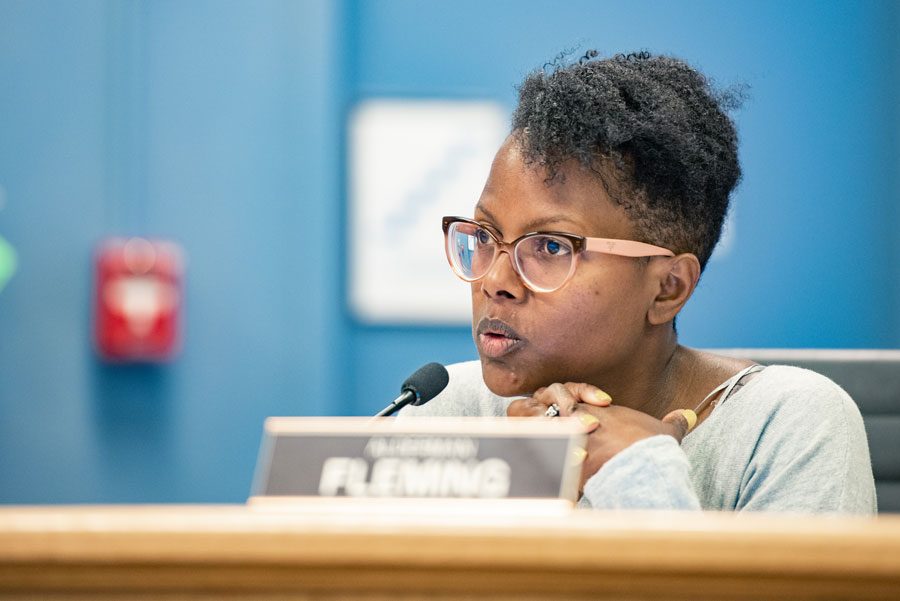City Council unanimously approves citizen police review commission after amendment
Evan Robinson-Johnson/Daily Senior Staffer
Ald. Cicely Fleming (9th) at a City Council meeting. Fleming amended the ordinance to remove the confidentiality and non-disclosure requirements.
November 12, 2019
At Monday’s City Council meeting, aldermen unanimously approved an ordinance creating a citizen police review commission after it was amended to remove the nondisclosure agreement section.
The ordinance is a response to a report by the Citizen Police Complaint Assessment Committee in December 2018. The citizen police review commission will be comprised of nine members, who cannot include elected officials or city employees.The purpose of the board is to “increase transparency and build a trusting relationship between the community and the Evanston Police Department,” according to city documents.
Specifically, the commission aims “to promote public confidence in the professionalism and accountability” of EPD through unbiased review of complaints and policy recommendations. The commission will also incorporate a “citizen perspective” in evaluating complaints and seek to provide a systematic means to improve citizen and police interactions.
At Ald. Cicely Fleming’s (9th) recommendation, the ordinance was amended by striking out language that specifies how members must sign a confidentiality and non-disclosure form regarding executive session information.
Fleming objected to the confidentiality requirement for members of the commission out of concern that other rules in executive session would also apply.
“It doesn’t necessarily communicate to the public that we’re trying to have a transparent and open process with our police complaint review board,” Fleming said. “I know people who have been following this issue… what they really wanted was more information, not less information.”
Fleming said the city should be able to waive confidentiality. To put confidentiality back in the ordinance, she said, erodes trust in the community.
Under the ordinance, the nine-member commission would review EPD’s internal investigation and evaluate its objectivity and fairness, among other factors, through watching videos, including body-cam footage, in closed sessions. Ultimately, the police chief and city manager have the authority to decide if there will be discipline for the officer in question, in accordance with state law.
As of 2015, Illinois is one of 15 states that have enacted legislation to codify a version of a Law Enforcement Officers’ Bill of Rights, a law that grants police special protections in criminal prosecutions and other investigations.
The ordinance for the commission specifies that “pursuant to the Collective Bargaining Agreement, only the police chief and the city manager are empowered to impose discipline.” The city’s collective bargaining agreement with the Fraternal Order of Police Union provides that the city can “hire, promote, demote, suspend, discipline or discharge” police for a just cause.
The Citizens Network of Protection — a group dedicated to police reform and civilian oversight — is concerned that the board would not be able to proactively address structural racism in policing, according to Austin Spillar, a member of the CNP.
“They use that language of proactive,” Spillar said. “When you read the ordinance… this is an advisory committee, it is a review committee. I don’t understand what about this is proactive.”
Email: [email protected]
Twitter: @cassidyw_


